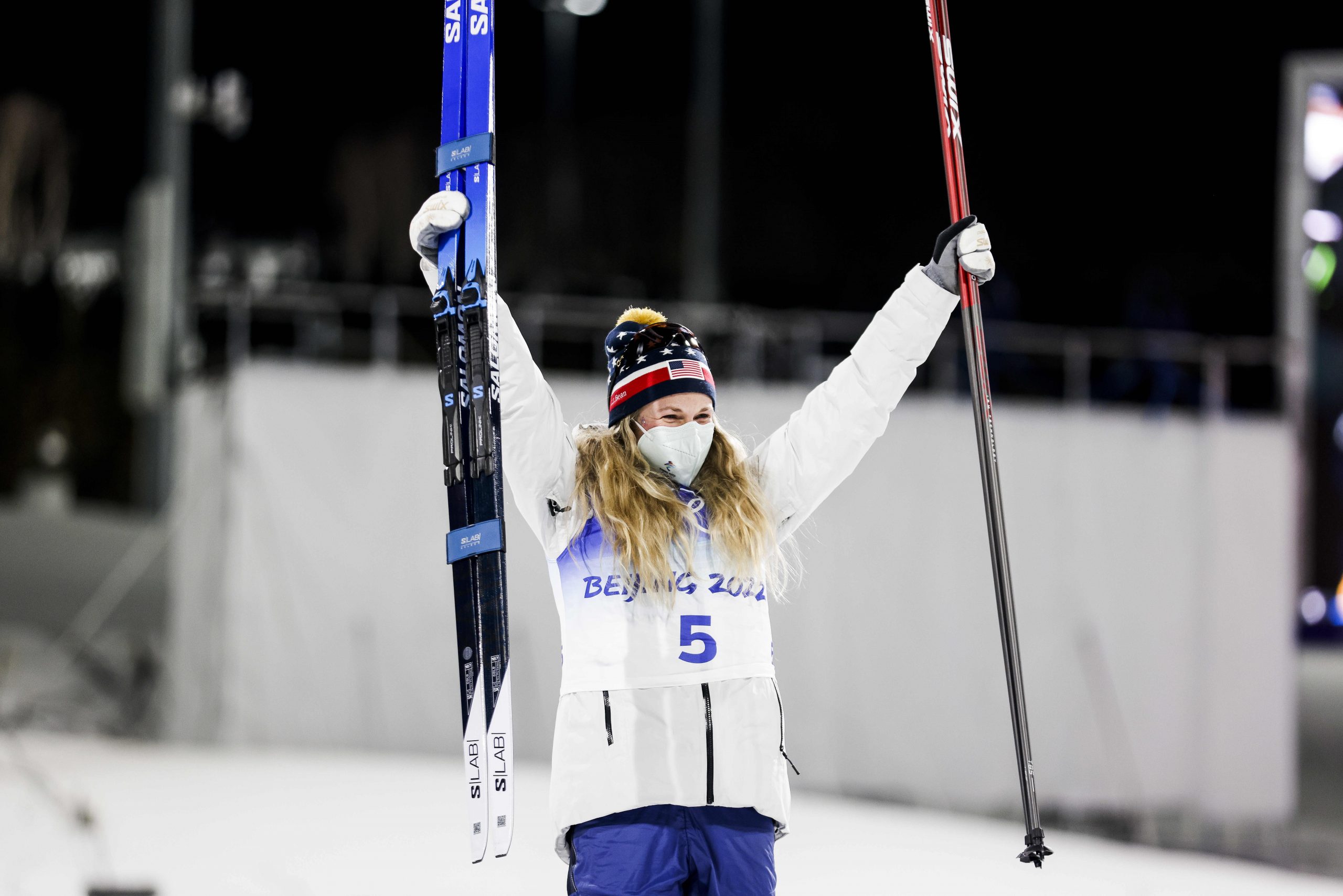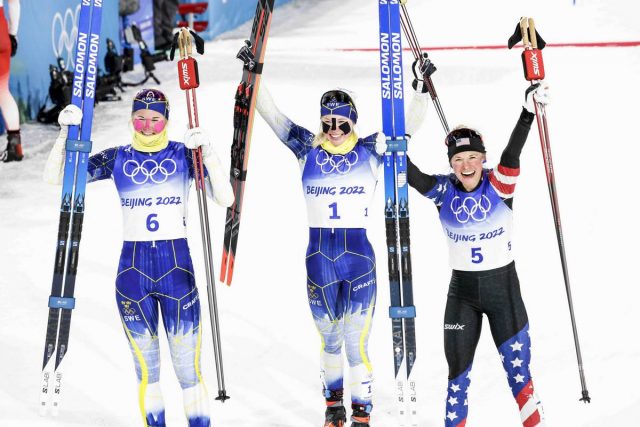Diggins’ historic accomplishment was glanced over by the giants of American media, falling back into harmful tropes that are all-too-common regarding women athletes. Reflecting on it re-centered how meaningful her vulnerability in sharing her struggle to overcome an eating disorder was to the skiing community, and was a source of strength for me.

The Olympic sprint race on Tuesday in Beijing was perhaps one of the most nuanced and complex races in Olympic history. We at FasterSkier wrote nearly 6000 words covering the men’s and women’s races, and even that wasn’t enough to capture the emotions our reporters felt sometime in the early hours that morning; a sublime mixture of national, community, and personal pride as we saw the skier – our skier – Jessie Diggins, continue her journey of inspiration, tenacity, and remarkable humanity as she won the first women’s individual Olympic medal in U.S. cross country skiing history. You could read our entire recap, watch NBC’s coverage, and still have to watch the race to realize that Diggins’ accomplishment is one you have to feel, rather than know. But we did our best to lean in, and describe the race for what it was.
The New York Times, though, chose a different approach. For reporter Matthew Futterman, the story of what Diggins was – a trailblazer – was what she wasn’t – “a one Olympic wonder.” It read as a misguided Cartesian mediation: “I think, therefore she wasn’t.” Diggins wasn’t just a story from 2018, she wasn’t a distance racer, she wasn’t a classic skier, and she wasn’t a woman who looked like a skier.
For us in the skiing community, NY Times pieces on our sport, written for the quadrennial American channel surfer, are always going to be disappointing. There’s a certain glee that emerges around the edges of cringe in seeing our lexicon lost, “classical” instead of “classic,” “freestyle” instead of “skate,” and the misinterpretation of sprint strategy as “struggling to keep pace.” If you want skiers writing about skiing, there’s a home for that here at FasterSkier.
Where there is justifiable room for disappointment is how cross-country skiing, and Jessie Diggins, become translated to larger American society by the largest newspaper in the nation. According to Futterman, this is a sport that’s all about which races will get you endorsement deals and how you look while getting them. But then again, his lack of context in either of these areas just has him coming off as a player in another ballad of a thin man – “Something is happening here and you don’t know what it is, do you, Mr. Futterman?”
Having Diggins’ bronze medal reduced to her somehow saving her career, as Futterman implies, is incensing in that it suggests this is all sound and fury. The top of the ladder in skiing is an Olympic result and having reporters who don’t understand your sport write about you is your reward. There’s no comment on Diggins’ transformative role in advancing the U.S. ski program from outsiders in the sport to models for success, or her team-facing attitude, camaraderie, and Nordic spirit which has reinvigorated that spirit in the nations it supposedly emanates from. There’s not even the due diligence to look up her FIS athlete profile and see that since 2018, she has been the best all-around female skier on the planet.
The second point, borne-out in a single sentence paragraph that I will leave inside the contexts of Futterman’s article, goes beyond infuriating. It has the potential, with its scope and platform, to be damaging to those already inside the skiing community. In summary, Futterman struggled to find anything to celebrate about how the race was skied, and so looked at the best skiers in the world and reduced them to the worst baseline tropes surrounding women, athletes, and in particular women athletes.
That he chose to do so with Diggins, in one of her highest, soaring moments, is an irony where the bite will leave a lasting scar. More than being the face of the skiing community in the United States, Diggins is our collective role model. A woman that everyone from a kid in a Bill Koch League to the 75-year old out on the Birkie trail can point their non-skiing neighbors to and say, “Her! I do the same sport as her!” She has taken every platform she has been offered through her grit and determination and chosen to turn those characteristics towards doing good for this community and for society writ-large.

Outside of skiing Diggins has focused her efforts on ensuring that everyone, skier or not, is empowered by the body that they have been given and its abilities. She has spoken out to raise the idea that a healthy relationship with food is something that is cultivated, and that it’s perfectly normal – and important – to ask for help with this relationship’s development.
Diggins’ efforts inspire everyone, but fill the particular contours of empathy to comfort, aid, and provide real help in the skiing community she comes from.
Eating disorders in the ski community are, by their ubiquity, almost implied to be an unfortunate part of the culture. We as a community can acknowledge that these disorders happen. From experience though, there is a rare blind spot around acknowledging and checking in on athletes that start to show symptoms. We are quick to launch into a chorus of “are you ok?!” when someone stumbles on the ski trail, but when the slow, grinding effects of not nourishing the body start to show, those “are you ok’s?” all-too-often lose the exclamation point and gain a whisper.
I haven’t been involved with a competitive team since I started ski racing where body image and disordered eating have not been an issue among my teammates. It is agonizing to see those that you love and support on the brink of letting food become the all-consuming focus of their psychology in a way that stops them from consuming it.
During my early high-school career, that teammate was me.
I started my high school racing career not touching food at all some days, at my lowest point weighing a mere 90 lbs while measuring 5’ 9’’, and skipping school somedays because getting out of bed meant facing a world where I didn’t have enough body fat to keep my internal temperature up. In my small, cornfed, Midwestern town, skiing had given me a glimpse of an identity that looked beyond all that, so I absorbed anything that told me what a skier looked like. That included skiing and running publications, yes, but that niche interest was overpowered by the deluge of casual comments about looking the part from those larger voices in our culture. Voices like those that come from the New York Times.
I did recover. It took hard-work, luck, and above all the grace and support of my parents and aunt (and future coach) Tracey Cote.

Still today though, get me talking about the struggle to get back to a healthy relationship with food, and if it hits me in the right way, I will cry real tears.
When Diggins first went public with her struggles, and subsequently released Brave Enough she allowed those tears that formed out of pain to turn to tears of relief. I could feel for the first time every quiet corner and empty space of the struggle I had gone through, and find solidarity in someone who’s achievements in this sport far surpass mine. She had walked the road of resolving to lock herself up before throwing away the key. She understood that it started with good things – you win races, you have a bright future, and you should be proud. That the disorder looked at all you, and all wanted to be, as a parasitic host. It hollowed your mind, then your spirit, and finally your stomach.
The scariest part is that it all happens at an essential level. The essence of your biological life – food, and the essence of being human – your connection to other humans, are both cause and cure, and somewhere between you lose yourself.
Jessie Diggins survived all that. Then she took that strength and will, spread it, and without hesitation, looked to turn around and help those in her own community. If the New York Times would like the answer to where she finds the power to surpass the achievements of any American skier before her, they ought to look at that. Not at the bodies doing the movement, but what they’ve faced and overcome, and most importantly, who’s spirits they’ve lifted. For Jessie Diggins, that’s been skiers everywhere, and for moments, like on Tuesday, people everywhere. Full stop.
Among them is this one skier. Who chooses to look closer at this sport as a medium through which they can be grateful for what another human is and does; Jessie Diggins.

"Opinion" - Google News
February 15, 2022 at 02:49AM
https://ift.tt/5Fu8Uo7
Opinion: “Her! I do the same sport as her!” Jessie Diggins won a Medal, Who She Is Goes Way Beyond That – FasterSkier.com - fasterskier.com
"Opinion" - Google News
https://ift.tt/sqiEKYU
Shoes Man Tutorial
Pos News Update
Meme Update
Korean Entertainment News
Japan News Update
No comments:
Post a Comment